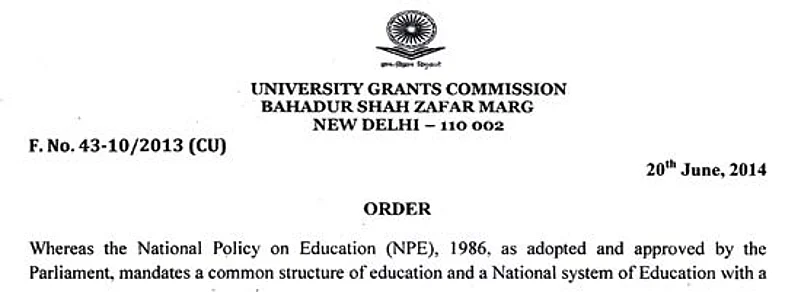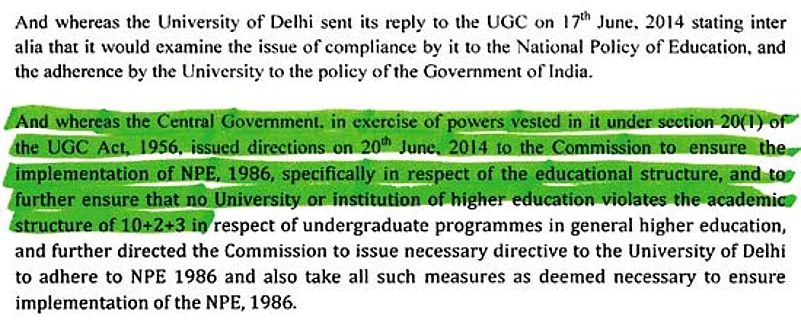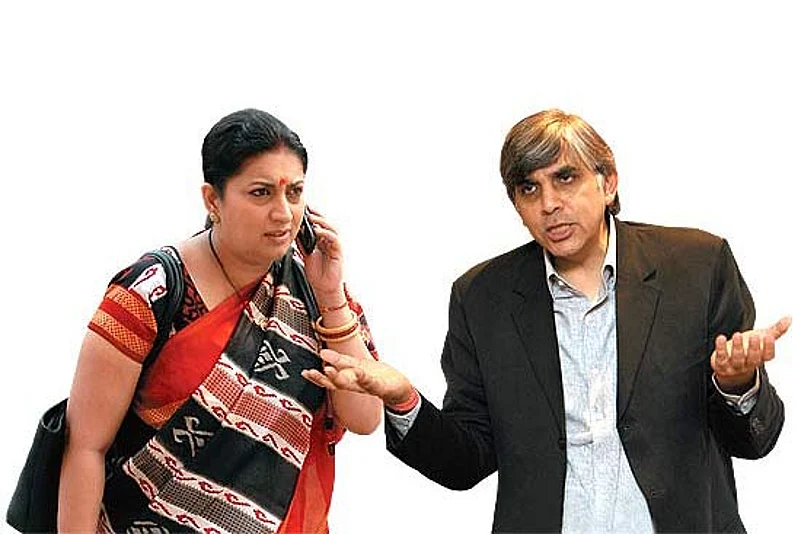Course Correction
- The Foreign Education Providers Bill and the Prohibition of Unfair Practices Bill: After BJP opposed it in Parliament 2 years ago, Irani will be looking at the bills afresh.
- National e-library and Central University of Himalayan Technology: Both figure high on Irani’s agenda and the BJP manifesto.
- New IITs in states which don’t have one: Sounds good on paper but in practice, there are some IITs facing a shortage of teachers, other staff and students.
- Appointment of vice-chancellors to 14 universities: Will be keenly watched. With most appointments being political in nature, watch this space to see how Irani walks this road.
***
Now pray, who are the semi-literates in the four-year undergraduate programme (FYUP) saga that has hit prime-time and headlines again? A June 25 edit in the Pioneer, edited by BJP MP Chandan Mitra, tore into the “semi-literate plebians” who opposed Delhi University vice-chancellor Dinesh Singh for standing up for his FYUP curriculum, but has left readers guessing who the edit was criticising. Coming from a right-of-centre newspaper, who could the editor have been directing its ire at? Could it be Union HRD minister Smriti Irani, at the forefront of the actions against FYUP, though trying to pass off as a silent spectator who is also studying to be a graduate? As a principled member of the BJP, she has to stand by the party manifesto, which had promised a complete revision of the curriculum. Could the edit be referring to the non-Stephanian teachers protesting against the FYUP, most of whom are on the left? Or could it be the protesting and confused students who have been left high and dry in the fight over a curriculum between a university, a spineless University Grants Commission (UGC) and an interfering ministry?
In the Singh versus Others battle, sadly, all institutions stand exposed in their duplicity. Delhi University is autonomous on paper, governed by an act of Parliament. In practical terms, universities in the country have been seldom isolated from politics and the political dispensation. Vice-chancellors are political appointments. For as long as vice-chancellor Dinesh Singh enjoyed the support of the UPA’s HRD ministers like Kapil Sibal, or his successors, MoS Pallam Raju and Shashi Tharoor, and some say even prime minister Manmohan Singh, he could bring about his curriculum overhaul unmindful of the protests in the campus.
But the UPA regime exited this May, giving way to the BJP-led NDA government. This made it difficult for him to continue with his plans unhindered. While the autonomous UGC, a guardian for all universities, acted in the most shameful manner by first agreeing to Singh’s blueprint and then derailing him in his tracks, it was doing so only at the behest of the HRD ministry in each instance. A study of the notices put out by the commission shows a sudden discovery of the strength to speak up. First, the commission red-flagged Singh’s proposal to go through with the four-year curriculum, or the FYUP, which was put in place a year ago. This was followed by a threat to Delhi University to withdraw the curriculum or else.... Last year, around the same time, the commission had developed a strange affliction which prevented it from speaking up on Singh’s proposal—a decision that had implications for universities in the country for whom DU serves as role model. (The new and much-smaller Ambedkar University in Delhi has a four-year curriculum in place.)
In a long-winded circular sent by the UGC to Delhi University on June 20, there are clues as to how the commission finally roared its disapproval (see graphic). Put simply, the ministry had directed the UGC to ask Delhi University to comply with the 10+2+3 curriculum structure and roll back the FYUP. It was this sarkari missive which went on to empower and prod the UGC to take an aggressive position on the issue. From here on, the UGC virtually declared an all-out war putting a question mark on the future of students already one year into the course. An order on June 22 said DU has not followed “the prescribed procedure and any deviation from 10+2+3 will be in contravention of the UGC Act, with its consequences”. It followed this with a public notice asking students and parents and the general public to seek admission only for the three-year undergraduate programme, since the FYUP was not proper. Another order to Delhi University’s 64 affiliate colleges followed. It demanded strict compliance with the 10+2+3 system—the old system, which the V-C had tried to supplant. The orders became more and more strident, and by June 24, the FYUP seemed to have run its course, its life cut short after being in place for a year.
Last year, when honorary UGC member Yogendra Yadav raised questions about the FYUP, he was given to understand that the autonomy of Delhi University was sacrosanct on such matters. He says, “The silence of the UGC then and its position now show how spineless some of our most sacred institutions are.” For his efforts, Yadav, now an Aam Aadmi Party member, was asked to step down. After all, Yadav had even dared to question Pallam Raju, then minister of state for HRD, on his decision to establish an inter-university centre for teachers’ training in Kakinada, no surprises, the minister’s constituency.



Away With It The UGC order asking Delhi University to revert to the 3-year course
Question is, did the vice-chancellor have a chance in the face of a new dispensation which wants him to go? Rumours float about his imminent resignation. On the afternoon of June 24, the press officer of the university announced Singh’s resignation—only to retract it in a few hours. Pro-BJP activist Madhu Kishwar added to the confusion with conflicting statements. By then, the action had shifted to the HRD ministry, which was in confabulation with pro-vice-chancellor Sudheesh Pachauri to ensure a smooth transition to the three-year curriculum.
If Singh finds himself isolated, with some big, respected academics not backing him in his endeavour, that is because in his hurry to steamroll the structure-altering FYUP curriculum, he overrode their objections. Many academics like Abha Habib wonder whether the FYUP was more about a UPA attempt to push a ‘reformist’ agenda and less about the curriculum. There were fears that FYUP was a preparation for the much-anticipated Foreign University Providers Bill, still hanging fire in Parliament, which will let foreign universities set up campuses in India. “We wanted a rollback even then,” says Habib.
There were others, like Satish Deshpande, head of the university’s department of sociology, who in a letter to the Planning Commission last year had cautioned about the haste in implementing the four-year structure. There are also academics who are not against FYUP per se, but only protest the confusion that prevails over the curriculum. Some of the scepticism also emanates from the low standards set for undergraduates in FYUP in the name of reform.
Imagine the scholarship required to answer the following question: “Describe your experience of travelling by the Delhi Metro. Do you think the ladies compartment has been a step in the right direction to ensure women’s safety? Give reasons for your answer.” The question—that might be appropriate perhaps at school level—is a part of the language, literature and creativity paper, meant for the foundation course of the FYUP.
Academics are clear such a dumbing down of the curriculum serves neither students nor teachers. Or take another question, which was part of the information technology foundation course. The sheer imaginative tenor of the question sets it apart from the rest. “One of your teachers has met with an accident and has a broken leg. She is recovering at home. She cannot physically come to the institute. Please suggest possible technical solutions she can adopt to impart teaching by remaining at home. Explain the features of the proposed technical solutions that can be used for this work.” Judge for yourself.

Teaching Trouble DU teachers protest the FYUP rollback. (Photograph by Tribhuvan Tiwari)
There are 11 foundation courses to be cleared by students in the first two years, leaving them hardly any time to focus on the main discipline in which they would be awarded a degree. The foundation course, as reported widely, embraces maths, culture, creative writing, history, literature and civilisation. The foundation course became a contentious issue as no plans were put in place for teachers to teach the subjects. The multiple exit points after two years, three years and four also had led to confusion as it was not integrated to the National Policy of Education. More contradictions abound. The distance learning programme of Delhi University still follows a three-year curriculum.
Further, the FYUP suffers from a disconnect with postgraduate programmes. And in making provisions for multiple exit points after the second year, third year and fourth year, it left questions about the variable standards in how different sets of students would have been put through the curriculum.
Going by its own mandate, the UGC could have served as a guardian of higher education and cautioned Dinesh Singh against haste in implementing a curriculum that had a lot of academics worried. Educationists should have been allowed an opportunity to revise the curriculum to match all needs for updation. And the Union HRD ministry should have respected institutions, instead of becoming an active participant in fuelling the debate.
Finally, should higher education be held hostage to political dispensations? The UPA and the NDA need to answer this question in all honesty before they claim to speak up for the little over 4.6 lakh students who will be looking forward to enrolling themselves as undergraduates.
Between the Congress and the BJP, neither seems to be a believer in the autonomy of institutions. Ten years at the helm, the UPA hardly gave higher education the kind of attention it deserved. For, among the many proposals that came up for consideration before the UGC was one from Pranab Mukherjee before he became the President of India. A request, forwarded to the UGC by then minister of HRD Kapil Sibal, wanted the UGC to examine the possibility of funds allocations for a college where Pranab once was a student and later a teacher. It is not surprising that former Congress ministers have criticised the HRD ministry for mishandling the situation and spoken up for Dinesh Singh, though as we saw he seems to have backers in the BJP too. Delhi University and its FYUP was a test case for the BJP and the new government and they have shown they aren’t averse to meddling in the university’s affairs. In the process, Delhi University has had to hold back admissions to go back to the three-year course. No prizes for guessing who’s left in the lurch.
***

Photograph by Sanjay Rawat
Here, There And Off-Course
- Jan 2012 V-C Dinesh Singh shares FYUP plans with the media. Insists it should be introduced in 2013.
- Sep At the academic congress, Dinesh Singh invites guests to speak on FYUP. A 4-year format is suggested and passed off as consultations on FYUP; is deemed to have been passed by a resolution. Work on overhauling curriculum begins, taking teachers by surprise.
- Nov DUTA slams V-C for not meeting teachers’ representatives since taking charge in 2010.
- Dec Emergency academic council is held where the proposal for change goes through amidst dissent. Agenda papers are made available only two days before the meeting. Executive council passes resolutions with three dissents.
- Jan 2013 DUTA starts protest. Delegation of academics represented by Romila Thapar, Krishna Kumar meet President Pranab Mukherjee. Left-backed Democratic Teacher’s Front stages protests.
- Mar Dean of colleges Sudheesh Pachauri asks department heads to finalise courses in 15 days; 10+2+3 is scrapped to make way for FYUP. Academics from departments of English, Economics, Psychology protest against FYUP.
- Apr MoS for HRD Shashi Tharoor tells Parliament that DU is prepared to launch FYUP; students from Northeast protest imposition of compulsory Hindi in foundation courses; 25 college staff associations protest against FYUP.
- Jul FYUP begins amidst confusion, including over multiple exit points for students to leave after two years, three years and on completion after four years
- Sep Right-wing National Democratic Teacher’s Front joins protests
- Nov BJP manifesto pledges to remove FYUP
- Jun 2014 ABVP demands rollback of FYUP
- Jun 20 UGC writes to DU asking it to roll back FYUP after directive from HRD ministry
- Jun 22 UGC threatens to freeze funds and puts a public notice for reverting to three-year curriculum
- Jun 24 V-C resigns, or does he? End of FYUP?


























